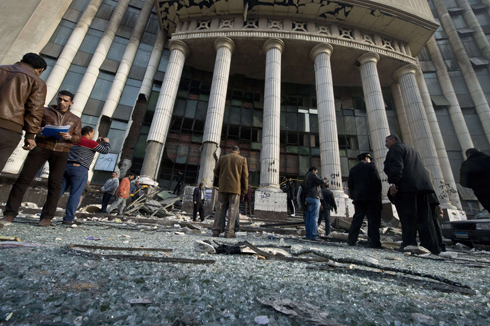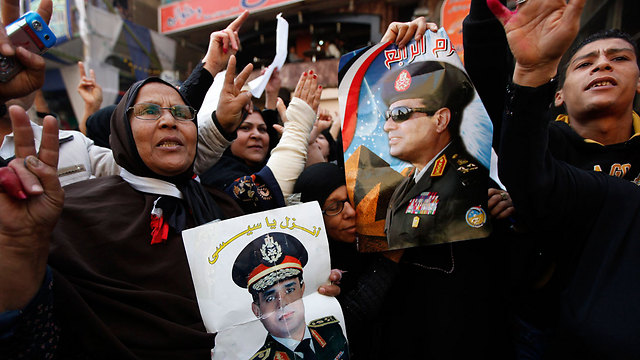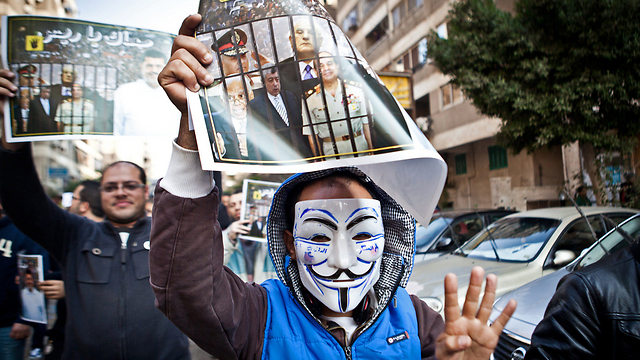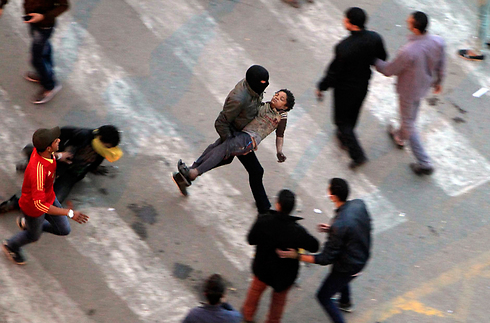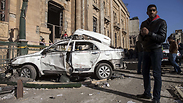
Egyptian police fired live rounds in the air to disperse about 1,000 anti-government protesters in central Cairo on Saturday, a Reuters witness said, amid fears of violence on the anniversary of the 2011 revolt that ousted autocrat Hosni Mubarak.
The witness said police also fired tear gas and birdshot at a crowd of secular-minded liberal activists attempting to march toward Cairo's Tahrir Square to protest against the military-backed interim government.
The explosion, which occurred as Egypt marks the third anniversary of January 25 Revolution - the uprising that toppled autocrat Hosni Mubarak – came only a day after a string of bomb attacks targeting police led to the death of six people and raised fears that an Islamic insurgency is gaining momentum.
Egyptian paper Al Aharam confirmed that one person was wounded in the blast which took place in the Ein Shams suburb of Cairo, and reported that serious damage was sustained to vehicles in the area.
According to eyewitnesses cited by the paper, two unknown assailants were seen fleeing the building, throwing an explosive device into the structure as they left.
Meanwhile, reports claimed that two additional explosives were found and neutralized in the Sohag district in southern Egypt.
Ahmed Mahmoud, an engineering student living close to the site of the attack, said that the blast shook his building and caused a brief power outage and when he went down to inspect, he saw a wrecked car and a damaged electricity box. He saw police cordoning off the area and ambulances rushing in. The police institute is meters (yards) away from a metro station.
Gen. Hani Abdel-Latif told The Associated Press that the blast took place at 7 am on Saturday in the busy district of Ein Shams, but damaged only the institute's walls. The small "incendiary bomb" lodged on the wall of the police training center and exploded without causing any casualties, a police official said.
Champions of Jerusalem
It was the fifth attack in the capital in 24 hours, after four blasts, including a car bombing outside police headquarters, killed six people on Friday.
A statement in the name of a Sinai-based al-Qaeda-inspired group has claimed responsibility for four bombings targeting police.
The claim in the name of Ansar Beit al-Maqdis, or the Champions of Jerusalem, was posted late Friday on two main militant websites that have previously carried statements by the group and other al-Qaeda allies and affiliates. It said the most powerful blast, an attack on Cairo's security headquarters that killed four, was a car bomb that was detonated by remote control.
It also claimed responsibility for three other attacks across the city, two of which killed one person each. The blasts set off panic across the capital.
The group, based primarily in the restive Sinai Peninsula, claimed it would carry out more attacks in the future. "We tell our dear nation that these attacks were only the first drops of rain, so wait for what is coming up." It warned "our people in Egypt to stay away from the police and security headquarters because we suffer a lot when we try to avoid inflicting harm to the Muslims."
Police were preparing to deploy heavily across the capital to secure Saturday's commemorations of the anniversary of the January 25, 2011 uprising that ended Hosni Mubarak's three-decade rule. Islamist militants have stepped up attacks since the army toppled President Mohamed Morsi of the Muslim Brotherhood in July. Hundreds of security forces have been killed.
Morsi's overthrow plunged Egypt into political turmoil which has hit investment and tourism hard. More violence is expected on Saturday, when rival political factions gather to mark the anniversary of Mubarak's downfall.
Spectacular revolt
As Egyptians mark the third anniversary of their spectacular revolt against autocrat Hosni Mubarak in the name of democracy on Saturday, there has been a powerful sign of the country's stunning reversals since: letters of despair by some of the prominent activists who helped lead the uprising, leaked from the prisons where they are now jailed.
The letters show a battered spirit, no longer speaking of imminent democracy, but of injustices and a failed struggle that they say has been robbed repeatedly.
"What adds to my feeling of oppression is that I feel this particular lock up has no value. This is not struggle, and there is no revolution," wrote Alaa Abdel-Fattah, one of the most prominent figures in the 2011 uprising. He was jailed several times in the past and was taken back into detention in November for calling for protests against Egypt's current, military-backed government.
The 18-day uprising launched on Jan. 25, 2011, rode on hopes for dramatic change in a country long ruled by an iron grip -- for an end to corruption and police power, for freedoms of speech and political rights and for greater economic equality. Those hopes went largely unfulfilled in the ensuing political roller coaster, as a council of generals took power for nearly 17 months after Mubarak's removal, and a string of elections brought Islamists to political dominance. Their rise was crowned by the 2012 election of the Muslim Brotherhood's Mohammed Morsi as president.
Now the "Jan. 25 Revolution" has been swallowed up by another mass movement: The "June 30 Revolution," named for the giant wave of protests starting on that date in 2013 against Morsi. It erupted after many Egyptians became convinced he and his Brotherhood had violated the dream of an inclusive, democratic Egypt. The millions in the street prompted the military to remove Morsi within days.
The demand of the June 30 revolt has become to restore stability, bringing together a military-backed government, the powerful police agencies and a broad sector of the public determined to crush Islamists they believe conspired to wreck the nation and change its identity. Security forces have arrested thousands of Brotherhood supporters and killed hundreds.
Reuters, AFP and the Associatd Press contributed to this report














